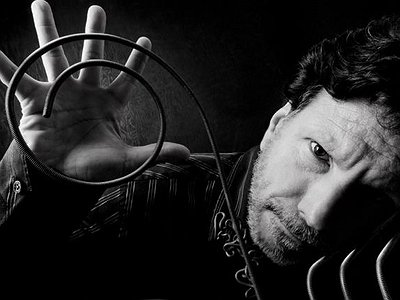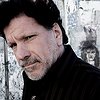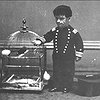The beat of his own idiophone
In a career that began by keeping the beat, Gino Robair has progressed to a lifetime of seeking out sounds and breaking down boundaries of how music is played and exploring what lies beyond melody, tone and rhythm. Whether he's writing, advocating or performing, he wants to rip up the rule book and throw open the doors in an attempt to take music from out-of-reach places and give it back to the people. Robair has played with John Butcher, Tom Waits, Fred Frith and John Zorn to name a few and has been an active academic voice studying Indonesian music with Lou Harrison and Jody Diamond and promoting the Bay Area Improv Scene. Creating music for dance, theatre, radio, TV, and gamelan orchestras, Robair has also been running his label Rastascan since the 80s and has most recently written an opera, I Norton, that is currently being performed in North American and Europe.
When did you start playing your instrument, and what or who were your early passions or influences?
For as long as I can remember, I've always tapped on and with things, using whatever was at hand (wooden spoons, pots and pans, fingers, etc.). At age 7 I talked my folks into letting me take drum lessons, and by the time I was 12, I knew that music was my calling.
My earliest influence was the AM radio, which in southern California in the early to mid-sixties played a wide range of music: rock, soul, country, and big-band jazz. When I was 12, my piano teacher, who was a church organist at the local First Baptist church, asked me to play percussion with his gospel choir and chamber orchestra and also for holiday services. So I was already playing professionally when I entered high school.
Throughout this time, however, I enjoyed improvising. When I got my hands on a 4-track reel-to-reel tape deck in high school, I would multitrack improvisations at different tape speeds, splice them together, and work with musique concrète in the ways I'd read about composers doing. But I didn't meet other musicians who enjoyed free improvisation until I entered college—the University of Redlands—where I worked with Barney Childs and Phillip Rehfeldt. There, I co-founded the Anything Goes Orchestra with other students and started the Rastascan Records label.
After graduating, a colleague suggested I study improvisation in the UK and introduced me to Eddie Prévost, who graciously agreed to meet with me on occasion. So I moved to London in '85 and took in as much of the scene as I could. It was during that time that I met Anthony Braxton, whose work I greatly admired. When my work visa expired in '86, I moved to the San Francisco Bay Area to study with Braxton and composer Lou Harrison at Mills College. The local scene was so vibrant that I decided to stay.
What do you personally consider to be the incisive moments in your artistic work and/or career?
I try to make every moment of music making incisive.
Keith Rowe once asserted that it is often certain people that “give one permission to do things”. How was that for you – in which way did the work of particular artists before you “allow” you to take decisions which were vital for your creative development?
It's in the nature of most percussionists to see everything as an instrument. Consequently, permission is something we feel we're given at birth: the world is our instrument. Where I grew up, percussionists played the strangest, most interesting music, so I gravitated towards them and felt at home.
However, at some point I began looking for models of ways to shed the role of timekeeper, and I found them in contemporary "classical" music and in recordings by Anthony Braxton, Sun Ra, AMM, and so forth, which were in the college radio station where I worked. But rather than look for permission, I simply congregated with musicians that accepted a drummer who worked more with timbre and melody than traditional rhythmic structures. That caused occasional friction in the rock bands I played in, but it was a good learning experience overall.
What are currently your main artistic challenges?
One of the challenges is to discover new sounds within drums and percussion.
Keith Rowe is a good example of a person whose work inspired me to look in new directions. He offered examples of an approach towards research, looking for ways to play the guitar that wasn't guitaristic. Consequently, I began to explore ways to play the drums without being drummerly. I avoided using sticks for a few years to see what would happen. In particular, I wanted to find ways to create sustained sounds without resorting to rolls and so forth.
Of course, it's common for percussionists to bow metal and wood idiophones, and for improvising drummers to work with frottage and fricatives. Some people scrape cymbals across rosined drum heads, others rub wooden sticks vertically to get tones. Using an electronic contact or driver to stimulate drums and cymbals is also a classic 20th century electronic-percussion technique.
Eventually, I discovered that I could play the wires of a snare drum with an Ebow. This led to the exploration of stand-alone metal objects that I could lay on a drumhead and play with the Ebow, such as the thin blades that fall from street sweeping trucks. If I balance things properly, the blade will slowly change position as it vibrates below the Ebow, alternating between high-frequency squeals and random-like beats against the drum.
Another satisfying direction has been to blow through a horn that is pushed flat on a drum. The air couples the horn to the head, causing the skin to vibrate. Based on the size of the drum, where I put the horn, and how hard I blow, I can get several fundamentals and their partials.
The other challenge was to find my own approach to solo improvisation. One dissatisfying aspect of the notion of "non-idiomatic free improvisation" is that, ultimately, we're playing instruments that we know intimately and we cannot truly escape their boundaries to the degree "free improvisation" suggests to me. In addition, I didn't want to feel like I need to have a specific set of instruments in order to play a high level of music. This is, in part, a reaction to the instrument fetishism that musicians of all genres have, particularly the classical and jazz virtuosi. It's also the result of having no control over the instruments and environment in which I play when I tour.
As a result, my approach is as much sculptural as it is about producing sound, while taking into consideration the physical and sonic qualities of the performance space. I work to create an evolving, site-specific sound environment using whatever I can get my hands on.
I sometimes involve the audience: in the performances I call "Potluck Percussion", I ask the attendees to bring things for me to play. The most memorable items include a package of hot dogs and a condom baked into a pan of gelatin. If there are microphones and contact mics, I will amplify whatever it is I "play", or I find ways to combine objects that make sense musically, visually, physically, or artistically. It crosses into performance art on occasion, but the artistic and intentional direction is based on sonic integrity rather than spectacle.
What do improvisation and composition mean to you and what, to you, are their respective merits?
In my mind, the two approaches feed each other. As a composer, I use improvisation to find materials that I want to make repeatable in some way. In my compositions, I develop things that inspire improvisation. And in my work, such as the opera "I, Norton," I explore the grey area between the two approaches where you can't tell one from the other.
There is a wonderful scene in a documentary about Harry Partch showing him improvising on the marimba eroica, developing parts that would end up in a composition. Even if you're creating an algorithm, developing a tone row, or setting up a scheme that will be controlled by chance operations, at some point there is improvisation involved as you determine materials.
Improvisation is such a natural phenomenon that it hardly merits mention, except that many people are put off by the idea of a music that is generated improvisationally. Every living creature has to improvise in order to survive. I see it as a way of life.







